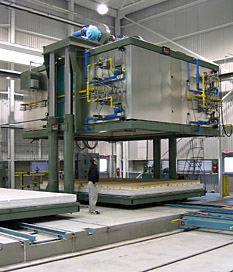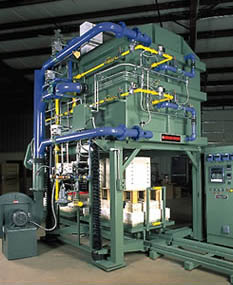High Temperature Kilns For Advanced Ceramics
HIGH TEPMPERATURE KILNS FOR ADVANCED CERAMICS
by James W. Dennis – President of HED International, Inc
The continued trend toward the development of advanced ceramic materials and related products has resulted in a greater need for reliable, specialized high temperature kilns. In particular, gas fired high temperature periodic (GFHTP) kilns are commonly used to process engineered alumina ceramics for applications such as semiconductor manufacturing equipment, microelectronics, and biomedical devices.
These GFHTP kilns typically fire to temperatures between 1550°C and 1820°C and can range in size from 0.2 cubic meters to as large as 50 cubic meters. Standard features include a very low 60°C startup and hold capability, excellent temperature uniformity throughout the kiln including +/- 5°C at low temperatures and approaching +/-1°C at elevated temperatures, and the ability to precisely control the kiln atmosphere between oxidizing and reducing conditions. These features make the GFHTP kiln an important part of many advanced ceramics production processes.
In addition to the demands of emerging technologies, advances in refractory materials, combustion components, and control systems used in GFHTP kilns have also brought about further improvements in the firing process. Moreover, engineering know-how, manufacturing experience and technical support are much more critical for a new GFHTP kiln installation than traditional thermal process systems. While there are applications better suited to continuous processing or electric radiant heating, in general, those high temperature processes that require the best possible temperature uniformity, firing flexibility, and production efficiency will find the modern GFHTP kiln a good fit.
The most common GFHTP kilns are box, elevator, bell, and shuttle type designs. Factors such as setting space needs, firing turnaround time, factory floor space, financial constraints, and personal preference will influence the decision to choose one type of GFHTP design over another.
From the process perspective, setting size is an important consideration when choosing the kiln type. For example, temperature uniformity is excellent in a front-loading box kiln up to 0.8 cubic meters after which limitations of burner configurations as well as loading restrictions become limiting factors to performance. In sizes up to 6 cubc meters, elevator kilns offer excellent temperature uniformity by providing more possible burner configurations, loading flexibility, and kiln car sand seal system.
Bell type designs offer the greatest temperature uniformity in relation to overall kiln size because they utilize a downdraft exhaust system that greatly reduces the thermal losses that occur in updraft systems. Bell kilns recently supplied for technical applications in the 50 cubic meter sizes have provided temperature control within +/-1°C from cold to soak. However, these are design generalizations, as both box, and elevator types may be designed with downdraft exhaust and recuperator systems. In addition to the setting size, the density and overall weight of the product, the method of loading and unloading the product, and the length of the firing cycle are also important considerations when selecting the kiln type.
Box kilns are better suited for small production cycles or research and development firings in which the product can readily be loaded and unloaded by hand. Elevators offer the best of both worlds, providing both versatility and production capabilities. Bell Kilns are ideal for volume production of technical ceramics and product loads that are especially large and heavy.
Manufacturer’s of technical ceramics continue to make products that push the envelope of materials engineering. These products are much more expensive per cubic centimeter than their traditional ceramic forbearers ever were, and the firing process requirements are far more demanding and critical. Fortunately, the modern gas fired high temperature periodic kilns is meeting those requirements today.
HED International, a leader in the design and manufacture of processing systems, has installations worldwide used in the production of advanced ceramics, fuel cells, rechargeable batteries, capacitors, electronic materials, thermal plastic adhesives and other tape cast products.
For more information on UNIQUE/PERENY Series of energy efficient kilns and furnaces, please contact:
HED International, Inc.
P.O. Box 246, 449 Highway 31
Ringoes, NJ 08551
Fax: 609 466-3608
Phone: 609 466-1900
Web-site: www.hed.com
Email: info@hed.com








